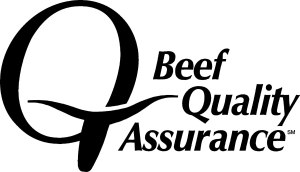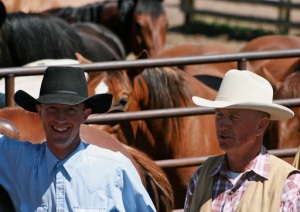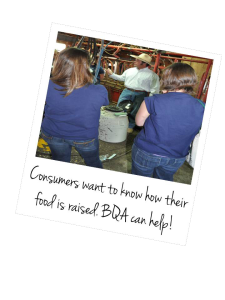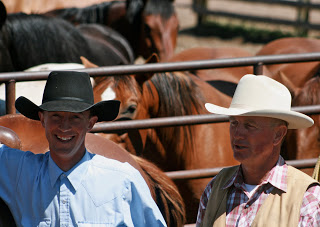 What is the Beef Quality Assurance program and what does it have to do with Animal Welfare standards for ranchers and cattle producers in the United States?
What is the Beef Quality Assurance program and what does it have to do with Animal Welfare standards for ranchers and cattle producers in the United States?
Beef Quality Assurance is a national program that provides guidelines for beef cattle production. The program raises consumer confidence through offering proper management techniques and a commitment to quality within every segment of the beef industry. Producers have embraced BQA because it is the right thing to do; but they have also gained through increased profitability. As an educating program, BQA helps producers identify management processes that can be improved.
Below is a bit of background information on the programs. For more on National BQA programs, visit BQA.org. For contact information in Montana, click here. For online BQA certification, click here.
History of the Beef Quality Assurance Program
The Beef Quality Assurance (BQA) program was established in 1987 by The Beef Checkoff to provide cattle producers with the tools and training necessary to assure animal health and well-being as well as provide a safe, quality product. BQA is a pre-harvest supply chain management program that applies the latest science and technology to ensure beef quality and safety. It unites animal scientists, veterinarians, feed suppliers, animal health companies, meatpackers, retailers and state and federal regulators with producers to achieve this common goal.
BQA Certification Process
BQA encourages anyone who works regularly with cattle – on the farm, ranch or feedlot – to become BQA certified by one of nearly 100 state coordinators through hands-on, classroom-style and online training. BQA influences the management practices of more than 90 percent of U.S. cattle.
BQA Guidelines Relating to Animal Care and Husbandry
The BQA principals on cattle care and treatment are captured within the foundational document, the “Cattle Industry’s Guidelines for the Care and Handling of Cattle.” The “Cattle Industry’s Guidelines for the Care and Handling of Cattle” is based on the “Producer Code for Cattle Care.” The Code, first developed in 1996, is a comprehensive set of “must-dos” for proper cattle care that includes the following:
- Provide adequate food, water and care to protect cattle health and well-being.
- Provide disease prevention practices to protect herd health.
- Provide facilities that allow safe and humane movement and/or restraint of livestock.
- Use appropriate methods to euthanize sick or injured livestock.
- Provide personnel with training to properly handle and care for cattle.
- Minimize stress when transporting cattle.
The Code is clear on another important point: persons who willfully mistreat animals will not be tolerated.
In 2003, the beef industry expanded the Code into a best practices guide. Developed through the interaction of animal health and well-being experts and cattle producer leaders, the “Cattle Industry’s Guidelines for the Care and Handling of Cattle” sets forth recommendations for every aspect of cattle production and provides producers a self-evaluation checklist to help improve their production practices. The Guidelines include best-management practices for feeding and nutrition, disease prevention practices and health care, identification, shelter and housing, cattle handling, transportation, non-ambulatory cattle, euthanasia and heat stress.
BQA Acknowledges Leaders for Applying Best Practices
For the first time in 2008, a National BQA Award was established to reward leaders in the industry who exemplify BQA principles and share their outstanding individual practices with the broader industry. Two producers were awarded the National BQA Award in 2008.
New BQA Programs Address Livestock Auction Markets and Transportation
In 2008, every auction market in the country received the checkoff-funded BQA DVD “Focal Point: An Auction Market Beef Quality Assurance Guide,” which demonstrates best practices for facility design and handling techniques. Cattle handling experts also conducted hands-on staff training sessions at livestock markets.
BQA’s Master Cattle Transporter Training program, launched in 2008, recognizes that cattle transporters play a critical role in the health and welfare of cattle by delivering cattle safely to their destination. The program emphasizes low-stress handling, frequent cattle checks when on the road and special care when transporting cattle during hot or cold weather conditions. Additionally, the program specifies that moving aids should replace electric prods and sick or weak cattle shouldn’t be accepted for transport, including debilitated thin animals, “downers” and animals that show symptoms of sickness. The National Trucking Association encourages its members to comply with these guidelines.
For more information about the BQA program, please visit www.BQA.org. National BQA programs are funded in part by The Beef Checkoff.













